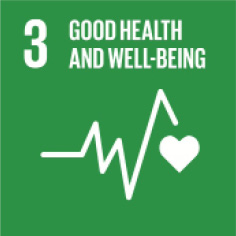Goodhealth and wellbeing
 Research
Research
All the "goodhealth and wellbeing" publications on the UNamur research portal.
Social impact and actions
Corporate initiatives
UNamur Student Harassment Protection (PHARE)

PHARE is part of a global plan to fight moral, physical or sexual harassment and to fight aggression and violence against UNamur students and doctoral students.
It has three main components: training, awareness-raising and remediation.
PHARE's priority is to act effectively on the remediation aspect, by offering optimal support to victims and witnesses. More information (in French) here...
The UNamur Medical and Psychological Centre
The Medical and Psychological Centre organises health promotion activities for students. It provides free psychological consultations, help with stress management, a medical consultation, 'health and well-being' initiatives, support for students with special needs, meditation workshops, 'methodo' lunches for EBS students, etc. More information (in French) here...
A miniguide to well-being for students
Take care of yourself to better take care of others. This is one of the aims of the practical course on student well-being followed by BAC 2 students in medicine. This practical course teaches you how to take care of your physical, mental and social well-being.
Sports policy
Sport is certainly a form of relaxation, but to be effective it must take place in a rigorous context. It must encourage spontaneity, physical development, and mental and physical balance. Read the brochure "Sports policy at the University of Namur - United by sport, guided by excellence" online (in French).
Within its third mission, the Faculty of Medicine works together with different institutions:
- Development Cooperation : CUD projects with Africa and Asia (education, research, PhD);
- Disability and poverty exclusion ((Conseil Consultatif Wallon des Personnes Handicapées, Conseil Supérieur Promotion Santé, SATIH);
- Taking part in ethics committees of health institutions;
- Working together with local health institutions (Cliniques Universitaires de Mont-Godinne, Institut de Pathologie et de Génétique de Gosselies)
- Giving medical advice to the European Medecine Agency (EMA).
Research institutes
Institute of Life, Earth and Environment (ILEE)
|
Research at the Institute of Life, Earth and Environment (ILEE) is relevant to several of the United Nations' Sustainable Development Goals (SDGs). For example, we study the impact of multiple stressors (chemical, physical or pathogenic) and/or pollutants (pesticides, pharmaceuticals, endocrine disruptors, neurotoxins, atmospheric residues) on organisms but also on ecosystems, and solutions are sought to strengthen their resistance and resilience and/or limit harmful products (e.g. immuno-stimulation, search for alternative pharmaceuticals). Furthermore, by prospecting and characterising geological resources (water, metals and other raw materials) and by integrating human use over the centuries, from Antiquity to the current Anthropocene, ILEE contributes to the sustainable management of natural resources, including architecture and art. The transition to a more sustainable agriculture is investigated through the concept of ecosystem services via mapping, modelling and integrated assessment. The consequences of climate change on human migration or the interactions between the different agents responsible for the transmission of vector-borne and zoonotic diseases are also at the heart of ILEE's research. Read more... |
 |
Namur Digital Institute (NaDI)
|
Ethics and technology One of the research themes of the Namur Digital Institute (NaDI) is "Ethics and Technology". Information technologies are deeply involved in the formation of the contemporary human condition and its social organisation. In a way, these technologies are "micro-politics" that endorse, in their concepts and conceptions, moral and political choices affecting our relationships to ourselves, to others and to the world. They are both a social construction and a social constraint. More about NaDI... |
 |
Namur Research Institute for Life Sciences (NARILIS)
|
From life sciences to health Research conducted at the Namur Research Institute for Life Sciences (NARILIS) aims at advancing scientific and medical knowledge for the benefit of patients. Basic research in life sciences is crucial to improve our understanding of normal and pathological processes in the human body. This exploratory research opens the door to substantial progress in prevention, diagnosis and treatment of diseases. Researchers of the University of Namur have developed strong relationships with field physicians at CHU UCL Namur hospital. These close ties are a unique opportunity to build bridges between basic research and clinical practice, and to work in a translational manner. On the one hand, questions raised by clinicians will guide scientists towards new research paths. On the other hand, some of the scientific discoveries may be translated to clinical applications, and ultimately improve patient care. NARILIS is actively contributing to the fight against cancer, infectious diseases, thrombosis, diabetes, obesity, inflammatory diseases, disorders of the nervous system, skin diseases and the effects of ageing. NARILIS also offers its expertise and resources to participate in the global efforts to tackle public health emergencies, such as the Covid-19 pandemic. More about NARILIS... |
 |
Spin-off QUALIblood
|
Created with the support of the FIRST Spin-off programme of the SPW Research, QUALIblood is a laboratory specialised in thrombosis and haemostasis which aims to help companies or public organisations to develop innovative medicines that reduce the risks of thrombotic disease. In addition to this theme, the spin-off also contributes to the development of diagnostic tests. More information here... |
 |















